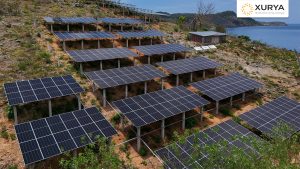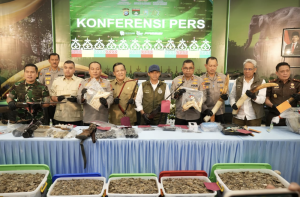Jakarta – Although touted as one of the pillars for achieving the 2060 Net Zero Emission target, the government acknowledges that implementing nuclear technology for energy still faces major challenges, ranging from investment costs to infrastructure readiness.
Deputy Minister of Energy and Mineral Resources Yuliot Tanjung, during the Nuclear Energy Regulatory Agency (BAPETEN) Executive Meeting on Monday, October 27, stated that nuclear power plants are now part of the main national energy policy and are no longer a backup option.
According to him, the government believes that nuclear power plays a role in strengthening energy security while supporting green economic growth. Yuliot said that the direction of national development policy has included nuclear power plants as part of the Asta Cita, particularly in terms of increasing energy independence and a sustainable economy.
Indonesia also has a historical foundation and regulations for developing nuclear power. Since the 1960s, three research reactors have been in operation: Triga Bandung, Kartini Yogyakarta, and Serpong Tangerang Selatan. The legal basis is also stipulated in Law No. 10/1967, RPJPN 2025–2045, and PP No. 40/2025, which emphasises the role of nuclear power plants in the future energy system.
Operational target for 2032: hydrogen becomes a new target for utilisation
In line with the planning document, the government targets the first nuclear power plant to be operational in 2032. Nuclear capacity is projected to continue increasing to 44 gigawatts (GW) by 2060. Of that amount, 35 GW will supply national electricity, while around 9 GW is planned to encourage the development of environmentally friendly hydrogen.
The contribution of nuclear energy to the energy mix is expected to reach 5% by 2030 and increase to 11% by 2060.
However, the government realises that the construction of a nuclear power plant cannot be carried out without strong financial readiness and risk management. “The investment for one nuclear power plant unit can reach USD 3.8 billion. In addition, the construction time is estimated to be 4-5 years,” said Yuliot.
Public concerns regarding nuclear safety in disaster-prone areas are also a factor that must be strictly controlled. The government has emphasised that every stage of development will be supervised by BAPETEN and involve technical cooperation with international institutions to ensure the highest safety standards.
The government is exploring new financing options and international partnerships so that the construction of nuclear power plants does not place an excessive burden on the national budget. The government affirms its commitment to weighing the benefits and risks to ensure a clean, safe, and sustainable energy future. (Hartatik)
Banner photo: Image generated by OpenAI’s DALL·E via ChatGPT (2024)















